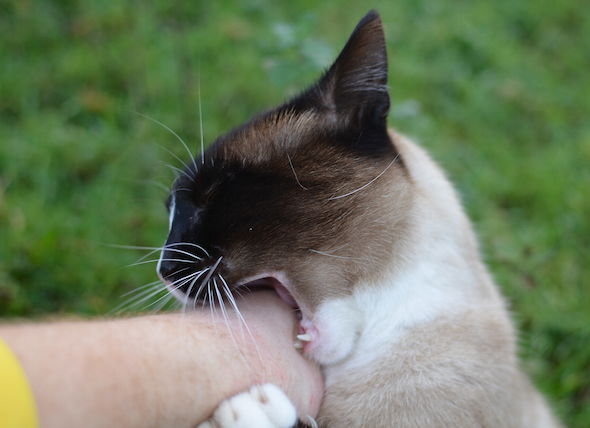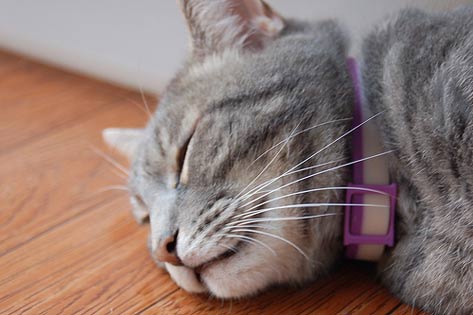

By Shara Rutberg
When you think of a cat, your initial image may be of a soft, peaceful animal purring quietly in your lap like a little furry engine of contentment. Unfortunately though, cats can pack a painful bite. Hopefully your cat reserves his or her chomping for toys and food, but if your cat starts biting you, there’s usually a reason for it.
“Cats don’t bite any more than any other animal,” said Marilyn Krieger, certified cat behavior consultant and author of author of Naughty No More. “Aggression depends on the circumstances, history and personality of the individual animal. Behavior doesn’t happen in a vacuum. There’s always a reason.”
Cats need daily predatory play, which includes the opportunity to grab, pounce and sink their teeth into something to simulate killing, said Sally J. Foote, DVM and International Association of Animal Behavior Consultants (IAABC) certified feline behavior consultant. “A happy cat is one who thinks he’s killed something every day,” she said. Because of this, movement, such as a person walking across the floor, triggers a predatory instinct and can cause a cat to pounce on an ankle or foot.
Another common reason cats bite is that the behavior was unintentionally reinforced when they were kittens, said Mieshelle Nagelschneider IAABC certified behavior consultant and author of The Cat Whisperer. “When cats are kittens, their job is to sharpen their hunting skills,” she says. Those skills include movements called the “pounce and bite” and the “grab and bite.” To practice those skills, a kitten needs something to bite, and it shouldn’t be your hand. While a kitten’s nip may not draw blood, their teeth will get bigger and their jaws will get stronger. If cats don’t learn that it’s inappropriate to bite people while playing as kittens, it’s only natural they’ll keep biting as cats.
While cats are very expressive creatures, they can’t come right out and tell you in that they’ve got a toothache or that arthritis is making their back hurt, so their biting could also be a way of letting you know there’s a medical issue. “Cats are very good at hiding when they’re in pain, so when they finally do bite, things may have gotten pretty painful,” Foote said. If your cat suddenly starts biting you, take them to a vet.
Some cats also bite because of something called redirected aggression, which can occur in humans too, Krieger said. “A human may have a bad day at work [then] come home and yell at their wife, while a cat may see another cat outside through the window, which can be very upsetting to them, and they take it out on whoever’s near them,” she said.
Nagelschneider has worked a lot with cats that do this kind of biting. Owners are likely to describe it as biting out of the blue, she said, as they had not seen the episode that originally upset the cat, only the cat’s delayed reaction to it.
If your cat does bite, take the wound seriously. More than with dog bites, the bacteria in cats’ mouths can lead to difficult-to-treat infections.
If your vet has ruled out any medical explanation for biting, make sure your cat has a daily outlet for predatory playing. “Every human should play with their cat for ten minutes every day with a feather or cat nip toy so they can ‘kill’ it,” Foote said. This daily play therapy will let your cat express that innate drive to kill.
Experts agree that playing appropriately with kittens using toys will help prevent them from biting people as adult cats. Kittens will naturally try to bite you while playing and when they do, don’t reprimand them, simply turn away and stop playing with them, Nagelschneider said. This mimics what a mother cat would do if play got too aggressive. “You’re teaching them social boundaries,” she said, “that if they play too hard, you’ll get up and walk away.”
Krieger calls this action giving your kitten a “time out,” just like you might do with a child. The technique also works for adult cats, as they’ll quickly realize that if they bite, their favorite person (you) will disappear. Leave the room, if only for a few seconds, then return to your cat, she recommended.
Don’t reprimand your cat by squirting it with water or using a shock mat, as those things may make the situation even worse, Foote said.
“[Negative reinforcement] may raise the anxiety level even more, plus, cats remember things very well and they can link the bad experience, like being squirted, with you,” she said. “They’ll think you are the one creating painful and awful things and act even more out of fear and aggression, or they’ll just hide from you all the time.”
When a cat bites, they’ve often tried to warn the person they’ve bitten that they’re about to do so. You usually can tell that a cat is agitated by their body language. Behavior that says “back off” includes tail thrashing, pinned-back ears, dilated pupils, and hissing and growling. Hair standing up on their back and whiskers facing forward can also be signs of agitation, Nagelschneider added.
If your cat bites you aggressively and your vet finds no pain trigger for the behavior, a veterinarian who specializes in feline behavior may try treating the cat with supplements, medication, a change in diet or a combination of all three, Foote said. The treatment will hopefully reduce anxiety that may be causing your cat to bite, and then he or she can return to strictly chomping toys and treats — not people.
 Declawing A Cat
Declawing A Cat What is declawing? Also known as onychecto
Declawing A Cat
Declawing A Cat What is declawing? Also known as onychecto
 10 Questions Every Pet Food Manufacturer Should Answer
By Vanessa Voltolina
Feel confident that your pet
10 Questions Every Pet Food Manufacturer Should Answer
By Vanessa Voltolina
Feel confident that your pet
 10 Ways to Stop Fleas from Biting Your Cat
By Jennifer Kvamme, DVM
There are l
10 Ways to Stop Fleas from Biting Your Cat
By Jennifer Kvamme, DVM
There are l
 A Cleaner, Greener Home for You and Your Cat
Breathe Easier Knowing Your Home is Toxin Free
&n
A Cleaner, Greener Home for You and Your Cat
Breathe Easier Knowing Your Home is Toxin Free
&n
 5 Tips for a Slimmer, Healthier Cat
How to Help Your Fat Cat Battle the Bulge
5 Tips for a Slimmer, Healthier Cat
How to Help Your Fat Cat Battle the Bulge
Copyright © 2005-2016 Pet Information All Rights Reserved
Contact us: www162date@outlook.com